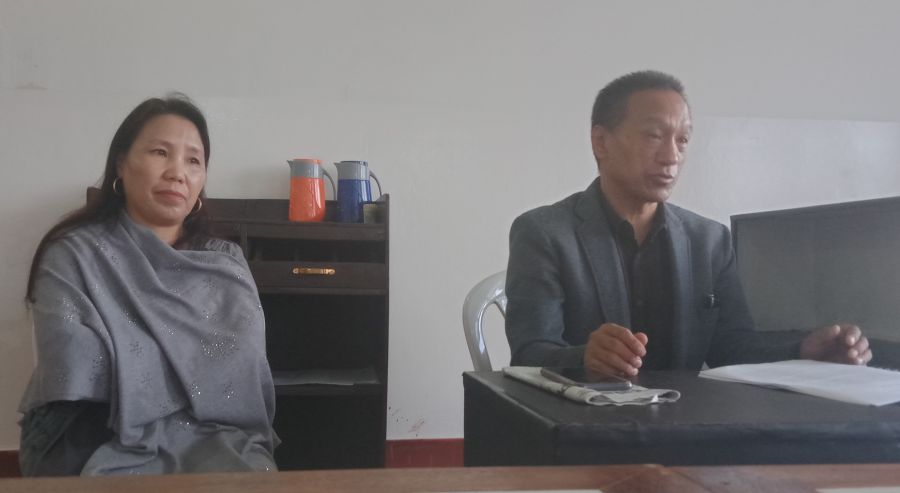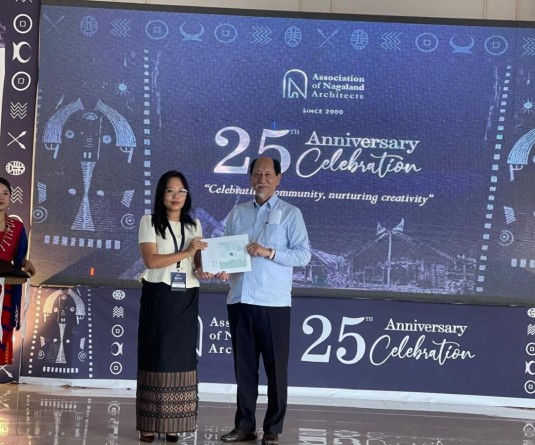Nagaland State should have a clear cut education policy: NEA

NEA President, Dr Zavise Rume and General Secretary, Dr Bweyhunle Khing addressing press conference on October 6. (Morung Photo)
Our Correspondent
Kohima | October 6
The Nagaland Education Association (NEA) today strong underscored the need for a clear cut education policy in Nagaland.
The Association will also work out the necessity to frame a comprehensive state education policy, NEA officials told a press conference held at DUDA Guest House, Kohima on October 6.
NEA has already initiated a policy research to assess the present status of education policy in Nagaland since the inception of the statehood, the officials said.
“We have collected a huge amount of relevant data for the study. We are going to get many more. We had many rounds of interviews with eminent scholars and educationists in the state and we will be continuing to do, so as to gather comprehensive data about the state policy on education in Nagaland,” stated NEA President Dr Zavise Rume.
“No education system would be more dangerous than that education system without any clear-cut state policy. A law-less education system will lead us to anarchy where we will tend to think of the whole affairs of education in our own terms and conditions,” he said.
The danger, he added, would be when the entire scheme and project of education is “being indiscriminately handled by any individual and thereby the survival of its quality rests at the mercy of those individuals who handle the education scheme where the professional educationists are left out without being involved in their own profession.”
Without a clear cut state policy, educationists will miserably suffer from isolation in their own profession after being encroached by any lay individual, the NEA maintained.
To this end, the Association informed that it will be holding its general meeting on October 8 at 11.00 AM at Ura College of Teacher Education, Kohima wherein the issues related to Nagaland state education policies and others would be discussed thoroughly.
‘Consult NEA on policy decision making process’
Meanwhile, pointing out that NEA is a professional organization to provide a common platform for educationists, educators, practicing teachers, scholars and intellectuals, the officials maintained that the Association should be consulted on policy making process.
NEA was formed to promote healthy interactions on issues related to education; safeguard the interests of educationists; promote professionalism in education; contribute a professional and technical service to the state government's education policy decision making process and to initiate various academic programmes so as to improve and sustain quality in education in the state, they informed.
The Association stated that the major problems in education in the society stem from the perception of general public that education is an easy subject which can be handled by any individual.
“This misconception has led to avoidance of educationists in all matters related to education policy decision making. This is the reason why every educated person who does not have any academic background in education as a subject of study claims to be an educationist. All the educated persons from all the subject backgrounds consider themselves to be educationists. This is the source of confusion,” the Association stated.
“Everybody defines education. Even people, who do not know what education, are defining education. People just blindly say ‘we need quality education’ without even know what quality education they are talking about,” it said.
The Association maintained that only professional people can deal with this kind of complex issue, adding that there are various problems confronting them.
“Educationists in the state are scattered and they do not come together under one professional organization,” NEA regretted adding “We do not have strong professional body of educationists practicing together like Medical and legal professions in the state. This is the reason why the present system of education is totally monopolised and handled by powerful politicians and high bureaucrats. The real educationists and educators who are practicing education every day are not consulted or involved in the actual policy decision making process.”
Often, the Association stated that the education practitioners are asked to merely implement any educational policy or program.
While maintaining that everyone must contribute to education, it also asserted that everyone can not be an educationist.
“Educationists are those who have specialized in theory and practice in education and have along years of practice and experiences,” the Association affirmed, adding: a person who does not have professional qualification to handle educational issues of professional in nature is not educationist or educator.
In this connection, the Association stated that it is time for the government to work with the educationists to ensure that the educationists are consulted in all the policy decision making process.
NEA general secretary Dr Bweyhunle Khing stressed on the need to give more focus on practical education in the state.
“We have to reorganize our education system,” she said.




